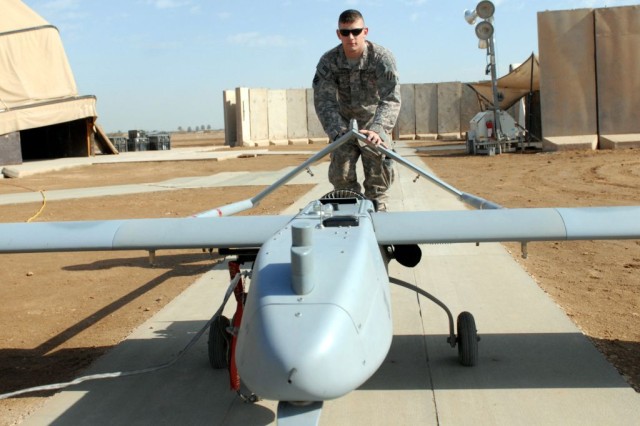Being a Soldier in the United States Army is more than a full-time job. And no one understands that more than the unmanned aerial vehicle cell at Forward Operating Base Kalsu.
The Soldiers assigned to the 3rd Heavy Brigade Combat Team, 3rd Infantry Division's UAV cell monitor the 3rd HBCT's area of operation from above 24 hours a day.
"We are always on the lookout for the bad guys," said Staff Sgt. Ray Lemlin, a platoon sergeant in "A" Company, Brigade Special Troops Battalion. "The goal is always to spot them before they can hurt us."
Since their arrival to FOB Kalsu, Lemlin's section has been vigilant in making sure that all of their aircrafts are ready to go, said Lemlin. A UAV that can't fly doesn't do anyone any good.
"Our platoon is very meticulous when it comes to maintenance," said Lemlin, a native of Miami. "We rarely have an aircraft down because of maintenance issues. We have never been at less than 75-percent strength."
"To be honest," he added, "we have never been at less than 100 percent for more than a couple of hours."
The section's commitment to excellence is shaped by their desire to keep their fellow Soldiers safe.
"It's our job to keep our guys out of harm's way," said Sgt. Richard Knuth, a maintainer in "A" Co. from Merkel, Texas. "It's a good feeling, but it requires us to have a pretty high set of standards. We can have a lot of down time between flights so we've got to maintain our focus and not let duties become routine."
According to Lemlin, his Soldiers must always be ready to launch a UAV, even when indirect fire is raining down on the FOB.
"Depending on where we have UAV operating, we may have to get another camera up when the bad guys try to throw indirect fire at us," he said. "That means our guys have to have the UAV up in 15 minutes or less."
Which, according to Merkel, is much harder than it sounds.
"When indirect starts coming in, it's our job to grab a head-set, run the UAV out to the launcher, double check the vehicle, go through our pre-flight checks and launch," he explained. "It takes three people to load the vehicle. It's 375 pounds; I wouldn't say it's heavy, but it takes a bit of work to get it ready to go."
They do all of this as everyone else on the FOB is running for the cover of concrete shelters.
"It's what we signed up for," said Merkel. "If we aren't out there in the open for those few minutes, we may miss a chance to catch the bad guys who are doing it."
Pfc. Anthony McCormack, a controller assigned to "A" Co. from San Diego, knows first-hand how dangerous that indirect fire can be.
"I was behind a concrete wall when a rocket landed about five feet from me," he said. "It was scary, but it did definitely help create a better sense of urgency in me. I understand why what I do is important, being on the receiving of something like that."
McCormack admits that his first deployment isn't exactly what he thought it would be, but he said that his motivation is still to keep his fellow Soldiers out of harm's way.
"As an enlisted Soldier, this is as close as you can get to being a pilot," he said. "It's a fun job, but it feels good to know that I'm helping keep Soldiers safe by checking routes, by looking for signs for buried explosives and finding enemies that are shooting rockets at us."
As the Soldiers of the 3rd HBCT continue their mission across five provinces in Iraq, they can rest assured they have an eye in the sky ensuring their safety.




Social Sharing